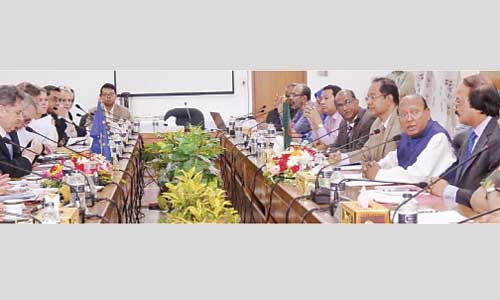Political uncertainties, growing militancy hold back FDI
Head of delegation of the European Union in Bangladesh Pierre Mayaudon on Thursday mentioned that political uncertainties, growing militancy and unpunished assassinations were the impediments to gaining foreign direct investment in Bangladesh.
‘Bangladesh has many assets for attracting foreign investments…..but foreign investments are not yet coming to Bangladesh in a big way,’ Mayaudon said at the Business Climate Dialogue organised by Bangladesh-EU Business Council at the commerce ministry conference room in Dhaka.
The EU ambassador said reinvestments by some Bangladesh-based foreign companies have been taking place but genuine new FDI falls short of expectation.
‘Of course, the uncertainties of political context are often put forward to explain this stagnation, together with growing militancy that now translates into multiple savage and still unexplained and unpunished assassinations, including of foreigners,’ he said.
Mayaudon said foreign investors also think twice before coming to Bangladesh due to shortage of energy and limited infrastructure.
At the dialogue, commerce minister Tofail Ahmed urged the EU nations to invest in the economic zones in Bangladesh as developers or unit investors.
‘Bangladesh government is investing heavily on large-scale infrastructure development and energy projects,’ he said.
Tofail said Bangladesh is trying to promote a transparent and fair trade environment in the country with the aim of making a positive change.
The commerce minister assured that the investment would be protected and investors would get support like domestic businesses.
The ambassadors of eight EU nations including the United Kingdom, Germany, France, Italy, Sweden, Netherlands, Spain and Denmark and representatives from five joint chambers of commerce and industry attended the programme.
At the first EU-Bangladesh Business Climate Dialogue, five issues including Bangladesh pharmaceutical sector, trade facilitation, licence and investment in the service sector, financial flows and tax regime were discussed.
‘We have discussed problems in pharmaceutical sector, transparency and reliability regarding information on duties, allowing import financing by export credit agencies from EU without opening letter of credit, licence issuing and renewal in the service sector, and complexities and ambiguities in tax regulations,’ commerce secretary Hedayetullah Al Mamoon said at a press briefing after the dialogue.
At the briefing, Mayaudon said numerous meeting of the EU business council had been devoted to identifying, documenting and putting in perspective the main obstacles the European private sector was facing in expanding its business in Bangladesh.
There was satisfaction but the European private sector is still facing difficulties in Bangladesh and the first session of the business council decided to overcome the difficulties, he said.
According to the official data, more than 55 per cent of the Bangladesh’s exports are concentrated to the 28 nations of EU.
The data showed Bangladesh’s export earnings from the EU in the financial year 2014-15 stood at $17.03 billion while the total export earnings of the country were $31.19 billion in the fiscal year.
News Courtesy: www.newagebd.net











